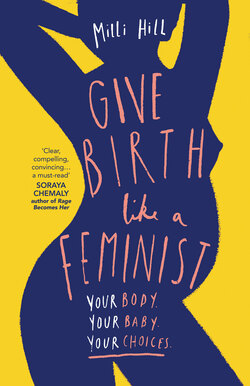Читать книгу Give Birth Like a Feminist - Милли Хилл - Страница 12
Good girls
ОглавлениеThere is a wider issue of compliance to those in ‘white coats’ that can affect all of us and is not purely a women’s issue. Most of us, male and female, have been conditioned to accept without question that ‘doctor knows best’ and to follow their ‘orders’. However, there is something about being female that makes challenging authority of any kind particularly difficult, perhaps because, as young girls looking around us as we grow, most of ‘authority’ is male. Politicians, lawyers, scientists, doctors, artists, philosophers: the default human-on-a-plinth is almost always male, and we grow up looking up to them and, consciously or unconsciously, absorbing maleness as synonymous with ‘leader’. The feminist campaigner Caroline Criado Perez has tackled this head-on, getting the first statue of a woman – Millicent Fawcett – in Parliament Square, along with Jane Austen commemorated on the new £10 note, but even in the twenty-first century, these are notable exceptions – and it’s worth remembering too that Criado Perez has been vilified in the media[16] and even sent death threats for her activism in this area.
As women, the social conditioning of a world dominated by men comes in tandem with consistent messages that compliance makes us more favourable humans. From birth, or even before, our culture encourages us to give girls toys, books and movies that suggest that being a girl has some connection to being passive rather than active, and conformist rather than confrontational. Even if we try to escape this as parents, our daughters will inevitably be given ‘home and beauty’ based toys of mirrors, cleaning equipment and plastic food, and often taught to sit neatly with their legs together, quite literally taking up less space than their male counterparts. Shoes, bags and even duvet sets are targeted at specific genders and carry similar messages: the emblem of the girl is the shy and gentle butterfly, while boys have dinosaurs and sharks as their totem animals. Even the clothes we are socially encouraged to choose for our daughters, and that they in turn are encouraged to choose for themselves, hold them back – and I speak as a mother who has spent many hours in parks watching little girls struggle to navigate climbing frames in a dress, while the boys are already ahead in their more practical and durable fabrics. Perhaps due to this early conditioning, once they hit school age girls are generally better at ‘self-control’ than boys,[17] and hence will be praised more consistently for being ‘good’, which tends to mean, ‘quiet’, ‘still’ and ‘not challenging’.[18]
Believe it or not, although you may not have been referred to as a ‘good girl’ for at least a couple of decades, you may well find the phrase returning to your life if you are pregnant, and even – yes, really – you may hear it loud and clear while you are ‘pushing’ your baby out. In February 2018 medical student Natalie Mobbs, NICE fellow Catherine Williams, and Professor of Maternal Health at the University of Liverpool Andrew Weeks – wrote an opinion piece for the British Medical Journal entitled ‘Humanising Birth’,[19] about the use of language in maternity care. In it they called on health professionals to consider more carefully the words they used to pregnant and labouring women, and alongside several other problematic examples, they called out the phrase ‘good girl’ as disrespectful to women as autonomous adults.
‘While some may mourn the days when the doctor was in charge and their advice was gratefully received and unchallenged, there are now multiple, alternative sources of healthcare advice available to women both before and after consultations. With improved knowledge among women and a renewed recognition of respect for human rights in childbirth, comes an equalisation of status between doctor and woman,’ they wrote, concluding, ‘The role of birth attendant is no longer “owner” of the situation but “facilitator” of the health services.’
